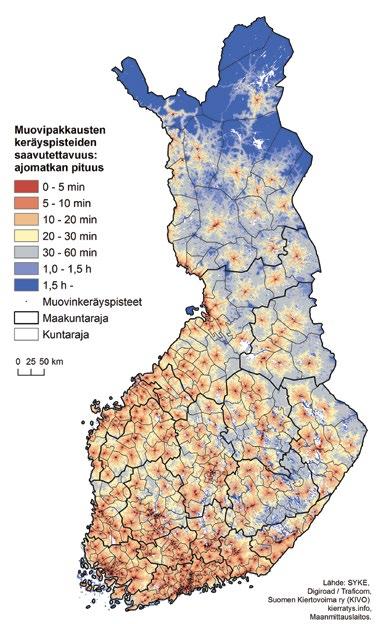14
An Independent Supplement by Mediaplanet
paper work and waste monitoring becomes more efficient, says Riitta Levinen. The aim is to get the revision of waste legislation before Parliament in late September or early October. According to Levinen, companies find the current system for when the waste is no longer classified as waste unclear and non–transparent. – We have received a lot of critical feedback on that. The legislative reform makes the procedure clearer. In addition, next year we will set up a working group to think about smooth practices. Stakeholders are also invited to join the group.
PHOTO: KAI WIDELL
Obligations for separate collection of bio and packaging waste will be reinforced.
ADVERTISING PUBLICATION
Companies involved in the Green deal
Circular economy is here to stay Companies’ transition towards a circular economy is accelerated both through the revision of waste legislation and voluntary agreements. Text Leena Rantajärvi
Getting rid of the paper work As part of the reform, a broader and more comprehensive digital waste information system will be established in Finland. The first thing is to develop a system based on electronic transfer documents. For example, information on hazardous waste as well as construction and demolition waste is stored in the system in the future. – In this way, companies get rid of their
Riitta Levinen Environmental Adviser, the Ministry of Environment PHOTO: SUSANNA KEKKONEN
and financing recycling and separate collection. Producer responsibility fees will also rise. Obligations for separate collection of bio and packaging waste will be reinforced for both households and businesses, service and administrative activities. – Waste sorting should be integrated into companies’ normal practices in a more comprehensive way. Companies should also think of ways to reduce manufacturing waste and recycle in a smart way, Levinen emphasizes.
PHOTO: OLLI HÄKÄMIES
– The revision of the Waste Act is at the heart of the circular economy, says Environmental Adviser Riitta Levinen from the Ministry of Environment. The targets for waste recycling will be tightened gradually every five years. For example, the recycling target for municipal waste will be 55 percent by 2025 and 65 percent by 2035. Currently, the recycling rate of municipal waste in Finland is about 40 percent. The recycling targets for packaging waste will also be tightened in the future. The reform of waste legislation is underpinned by the EU’s waste legislation. – We are now looking at what instruments and changes in legislation are needed in Finland to achieve these goals. We are also looking for ways to ensure that products are designed to be recyclable from the very beginning. Producer responsibility for packaging producers, such as the food industry and trade, is expanding. They will have broader responsibilities for organizing
Leena-Kaisa Piekkari specialist,the Ministry of Environment
Voluntary Green Deal agreements accelerate the transition of companies to a circular economy and low–carbon future. – The Green Deal has been well received. Most recently, we signed an agreement with the real estate association Rakli on the reuse of demolition materials and increased recycling, says Leena–Kaisa Piekkari, a specialist at the Ministry of Environment. She is responsible for the preparation and development of Green Deal agreements. – The agreements define the actions through which companies will promote the circular economy and low–carbon activities, and define how the effects will be monitored on an annual basis. We will follow up on the actions taken by companies and, for example, industry–specific waste volumes, Piekkari describes. Agreements have also been made with, for example, the Finnish Automobile Confederation and Finnish Environmental Industries YTP. Each company makes its own commitments. The company does not have to be a member of the association. – We will soon sign agreements on how public procurement will reduce emissions from construction sites and harmful substances in the environment of kindergartens. An agreement on the separate collection and recycling of plastic materials for packaging in the construction industry is also currently under negotiation, Piekkari says. A Take Away Green Deal is being prepared with the restaurant and retail industry with the aim of reducing the consumption of disposable plastic packaging.
The agreements will reach a concrete level – Through agreements, we usually strive for rapid changes. The time span is 5–10 years, says Leena–Kaisa Piekkari. For example, the goal of the real estate association Rakli’s sustainable demolition agreement is that the inventory of building materials and harmful substances, i.e. demolition inventory, will be widely used by the parties to the agreement in 2025. Companies get to influence the actions they need to take. – Preparing agreements has helped us to understand companies and vice versa. We have tried to find new ways of working and the most satisfactory solutions possible. The companies have appreciated the fact that the agreements are so concrete.
ym.fi/lainsaadantopaketti sitoumus2050.fi/en/web/







